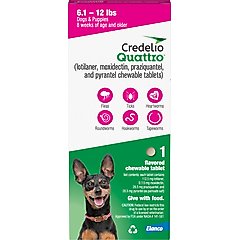Imagine coming home to your happy, wagging-tailed companion, only to discover that something seems off. Your furry friend isn’t as lively, and you notice some troubling signs.
Could it be because you haven’t kept up with deworming? What really happens if you skip this crucial step in your dog’s care routine? This isn’t just a minor oversight; it could be the key to your dog’s long-term health and happiness.
We’ll uncover the hidden risks of not deworming your dog and why it’s a decision you can’t afford to ignore. You might be surprised to learn how this simple act can prevent serious health issues, not only for your pet but for your entire household. Keep reading to ensure your beloved dog gets the best care possible, safeguarding both their health and your peace of mind.

Credit: www.petmd.com
Common Dog Worms
Common dog worms are parasites that live inside your dog’s body. They can cause serious health problems. Dogs can get worms from soil, other animals, or even their mother. These worms grow and multiply inside the intestines. They steal nutrients and can harm your dog’s organs. Knowing about common worms helps you protect your dog better.
Types Of Intestinal Worms
- Roundworms:Long, white worms that look like spaghetti. They are common in puppies.
- Hookworms:Small worms that attach to the intestines and feed on blood.
- Tapeworms:Flat, segmented worms often passed in a dog’s stool.
- Whipworms:Thin worms that live in the large intestine and cause diarrhea.
Symptoms Of Worm Infestation
- Weight loss despite a good appetite
- Diarrhea or vomiting
- Visible worms or eggs in stool
- Belly swelling or bloating
- Lethargy and weakness
- Itching around the anus
Health Risks Without Deworming
Skipping deworming puts your dog at serious health risk. Worms harm many parts of the body and can cause lasting damage. Understanding these health risks is key to keeping your pet safe and healthy.
Impact On Digestive System
Worms live in your dog’s intestines and feed on its blood or food. This causes irritation, diarrhea, and vomiting. The digestive system can become blocked or inflamed. Your dog may lose interest in food and feel weak.
Nutritional Deficiencies
Parasites steal important nutrients from your dog’s body. This leads to weight loss and poor coat condition. Puppies are especially vulnerable and may stop growing properly. A lack of vitamins and minerals weakens your dog’s immune system.
Organ Damage
Some worms travel to organs like the liver, lungs, or heart. They cause damage and inflammation in these organs. This can lead to serious illnesses and even death. Organ damage from worms often needs costly veterinary treatment.
Behavioral Changes In Dogs
Dogs infected with worms often show noticeable changes in behavior. These shifts can signal discomfort and health issues. Paying attention to these signs helps in early detection and care.
Lethargy And Weakness
Worm infestations drain a dog’s energy. Infected dogs may sleep more and move less. They can struggle with simple activities like walking or playing. This tiredness is a clear sign of internal distress.
Appetite Fluctuations
Worms affect a dog’s hunger in different ways. Some dogs eat less because of stomach pain. Others may eat more but still lose weight. Changes in appetite often point to digestive problems caused by worms.
Irritability And Discomfort
Dogs with worms can feel itchy or uncomfortable. They may scratch or bite their skin frequently. Restlessness and whining are common too. This behavior shows their struggle with pain or irritation inside their bodies.
Transmission To Humans
Transmission of worms from dogs to humans is a serious health issue. Dogs that are not dewormed carry parasites that can pass to people. These parasites live in the dog’s intestines and eggs or larvae spread through their feces. Humans, especially children, can accidentally ingest these eggs and get infected.
Zoonotic Risks
Zoonotic diseases are those that spread from animals to humans. Worm infections like roundworms and hookworms can cause health problems in people. Roundworm larvae can migrate through the body, causing damage to organs. Hookworms can penetrate the skin, leading to itching and rash. In some cases, infections cause serious illness requiring medical care.
Preventing Infection
Good hygiene helps reduce the risk of transmission. Always wash hands after handling dogs or cleaning up feces. Avoid allowing dogs to lick your face or mouth. Keep your yard clean and pick up dog waste daily. Regular deworming of dogs is crucial to stop the spread of parasites. Consult your vet for the right deworming schedule and products.
Long-term Consequences
Ignoring deworming can lead to serious problems for your dog over time. Parasites grow and spread inside their body. These worms harm vital organs and weaken your dog’s health. The damage worsens slowly and might not show clear signs early on. Long-term effects cause lasting discomfort and illness.
Chronic Health Problems
Parasites cause ongoing health issues that drain your dog’s energy. Worms block nutrient absorption, leading to malnutrition. Your dog may suffer from:
- Persistent diarrhea
- Vomiting
- Weight loss
- Skin problems
- Weakness and fatigue
These problems often return because worms continue to multiply. Organs like the liver, lungs, and intestines can be permanently damaged. This makes it harder for your dog to heal from other illnesses.
Reduced Lifespan
Untreated worms shorten your dog’s life significantly. The stress on the body from parasites causes severe health decline. Chronic infections weaken the immune system. Dogs with heavy worm infestations often face fatal complications.
Young puppies and older dogs are especially at risk. They may suffer from anemia or organ failure due to parasites. Deworming helps avoid these risks and supports a longer, healthier life.

Credit: petcube.com
Deworming Best Practices
Deworming is essential for your dog’s health and well-being. Following the right practices helps keep your dog free from harmful parasites. These simple steps protect your pet and prevent serious health problems. Knowing the best way to deworm ensures your dog stays happy and active.
Recommended Deworming Schedule
Start deworming puppies at two weeks old. Repeat every two weeks until they reach 12 weeks. After that, treat monthly until six months old. Adult dogs need deworming every three to six months. Regular treatment stops worms from growing and spreading.
Choosing Effective Treatments
Select dewormers that work on common parasites like roundworms and tapeworms. Use products labeled for dogs only. Pills, liquids, and chewables offer options for easy dosing. Check the active ingredients to match the parasite type. Avoid using products meant for other animals.
Consulting Your Veterinarian
Your vet can recommend the best deworming plan. They identify the specific worms affecting your dog. Testing stool samples helps find the right treatment. Vets can suggest safe products based on your dog’s age and health. Regular vet visits support a parasite-free life for your dog.

Credit: zigzag.dog
Frequently Asked Questions
What Happens If I Don’t Deworm My Dog Regularly?
If you skip deworming, your dog may suffer from severe intestinal infections. Worms can cause weight loss, vomiting, and diarrhea. Untreated worms can weaken your dog’s immune system and lead to serious health complications or death.
Can Worms In Dogs Affect Humans Too?
Yes, some dog worms, like roundworms, can infect humans. Children are especially at risk. These parasites can cause serious health issues if transmitted, so regular deworming protects both your dog and family.
How Often Should I Deworm My Dog?
Most veterinarians recommend deworming every 3 to 6 months. Puppies need more frequent treatments. Regular deworming keeps your dog healthy and prevents parasite buildup in the environment.
What Are Signs My Dog Needs Deworming?
Look for symptoms like diarrhea, vomiting, bloated belly, and weight loss. Your dog may also show lethargy or a dull coat. If you notice these signs, consult your vet for deworming.
Conclusion
Skipping deworming risks your dog’s health and comfort. Worms can cause weight loss, vomiting, and diarrhea. Untreated infections may lead to serious illnesses or death. Your dog can also pass worms to your family. Regular deworming keeps your dog happy and safe.
It protects both pets and people around them. Don’t wait for signs of illness. Act early to keep your dog healthy. Simple care makes a big difference.

